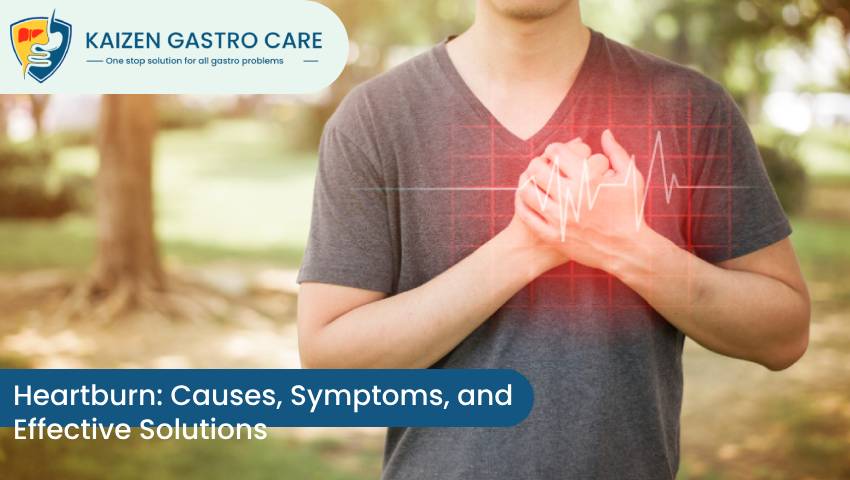
- 09/01/2024
- Kaizen Gastro Care
- 0 Comments
- Digestive Disorder
Heartburn: Causes, Symptoms, and Effective Solutions
Heartburn is a common and annoying feeling that many individuals experience at some point in their lives. Whether it’s an occasional or an ongoing problem, understanding the causes, identifying signs, and finding effective solutions are essential for maintaining optimal digestive health. In this blog post, Kaizen Gastro Care, the best gastroenterology center in Pune, sheds light on this prevalent issue, exploring its causes, and symptoms, and offering effective solutions to help you find relief and stimulate overall digestive health.
What is heartburn?
Heartburn is a burning sensation in your chest, behind your breastbone, caused by stomach acid traveling back up into your esophagus, the tube that brings food from your mouth to your stomach. It’s quite ordinary, and most people experience it occasionally.
What are the symptoms of Heartburn?
Here are the most common signs, including:
- A burning sensation in the chest that usually happens after eating and may occur at night
- Sour or bitter taste in the mouth
- Pain that worsens when you lie down
- A feeling of food stuck in the chest or throat
- Difficulty in swallowing
- Regular burping can be an indication of heartburn
- Persistent coughing, mainly at night
If you’re experiencing persistent symptoms of heartburn, consult with the best acidity specialist in Pune for proper diagnosis and treatment.
What causes Heartburn?
Heartburn, that burning sense in your chest, is mainly caused by stomach acid backflow into your esophagus. This happens when the lower esophageal sphincter (LES), the muscular valve between your stomach and esophagus, doesn’t close properly or weakens, permitting acid to leak back up.
Some common causes include:
Dietary Factors:
- Spicy or Acidic Foods: Spicy and acidic foods, such as citrus fruits, tomatoes, and certain spices, can upset the esophagus and trigger heartburn.
- Fatty Foods: High-fat meals can slow stomach emptying and relax the LES, enhancing the likelihood of acid reflux.
Lifestyle Factors:
- Smoking: Tobacco reduces the LES and increases stomach acid production, significantly improving the risk of heartburn.
- Pregnancy: Hormonal changes and enhanced abdominal pressure during pregnancy can make women more prone to heartburn.
- Obesity: Excess weight puts stress on the stomach and abdomen, pushing stomach contents toward the esophagus.
- Certain medications: Certain medicines can aggravate the stomach lining and weaken the LES.
- Stress and anxiety: Passionate stress can trigger heartburn by affecting stomach acid production and LES function.
Other Medical Conditions:
- Hiatal hernia: This condition occurs when part of the stomach pushes through the diaphragm into the chest cavity, weakening the LES and causing reflux.
- Gastroesophageal reflux disease (GERD): This chronic condition involves regular and painful acid reflux, leading to more persistent heartburn signs.
If your heartburn occurs frequently or becomes severe, consult the best Heartburn specialists in Pune, Maharashtra, to rule out any underlying medical conditions and get proper treatment.
What are the complications of Heartburn?
Here are some of the most common complications of heartburn:
- Esophagitis: This is inflammation of the esophagus caused by stomach acid.
- Barrett’s esophagus: This is a condition in which the cells lining the esophagus change to resemble the cells lining the intestines.
- Esophageal stricture: Esophageal stricture can make it challenging to swallow food and liquids.
- Respiratory problems: Stomach acid can aggravate the lungs, leading to coughing, wheezing, and asthma.
- Dental problems: Stomach acid can deteriorate tooth enamel, leading to cavities and tooth decay.
When to see a doctor about heartburn?
- Heartburn happens more than twice a week
- Symptoms persist despite using over-the-counter medicines
- Heartburn episodes become more frequent or severe
- You experience heartburn at night, disrupting your sleep
- Acid reflux interferes with your daily activities or quality of life
- Do you have concerns about swallowing or feel pain when swallowing
- You have unexplained weight loss or reduced appetite
- You experience nausea or vomiting with your heartburn, especially if you vomit blood or black material
- You have chronic hoarseness, wheezing, or aggravating asthma
- Bloody vomit or black, tarry stools
- Difficulty swallowing
How to Prevent Heartburn?
Heartburn, that burning sense in your chest. But the good news is, there are plenty of things you can do to control it or lessen its impact. Here are some tips:
- Identify and avoid trigger foods
- Eat smaller, more frequent meals
- Drink plenty of water
- Choose heartburn-friendly foods
- Avoiding specific foods that trigger heartburn, such as spicy or fatty foods
- Don’t smoke
- Limit alcohol, coffee, and carbonated drinks
- Sleep on your left side
- Wear loose-fitting clothing
- Keep a healthy weight
- Elevate your head while sleeping
- Avoid strenuous exercise after eating
- avoiding eating 2–3 hours before sleep
Don’t ignore heartburn, especially if it’s accompanied by other symptoms like chest pain, difficulty swallowing, or vomiting. These could be signs of a more serious concern.
Conclusion:
Heartburn is a common distress, but with the right knowledge and strategies, its impact can be minimized. Kaizen Gastro Care supports a holistic approach, combining lifestyle modifications, medicine, natural therapies, and expert guidance to ensure lasting relief from heartburn. Don’t let heartburn dictate your life – take control with Kaizen Gastro Care’s comprehensive solutions.
